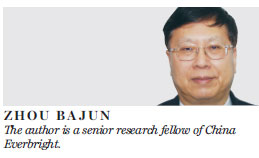HK development needs to 'go big'
Updated: 2015-07-10 07:27
By Zhou Bajun(HK Edition)
|
|||||||
Zhou Bajun writes that the government should take its cue from the mainland and foster a new era of grand ambition in Hong Kong to safeguard livelihoods
Hong Kong is now in the "post-reform" period after the government's electoral reform package was blocked by opposition lawmakers. The government is determined to shift public attention from constitutional reform to economic development and livelihood issues. This decision has won popular approval, as shown by the sharp decline in the number of participants in the annual July 1 rally held by the opposition camp.
Admittedly, Hong Kong's economic and livelihood issues are fraught with deep-rooted problems. These include the difficult transformation of the SAR's industrial base, curbing the growing income gap, improving career and home purchase opportunities for young people and boosting people's retirement incomes. These challenges have been around for so long and are so inter-related there is no easy way to crack them. To solve these problems Hong Kong must "go big". This is the best way to build public consensus and push aside attempts at disruption by the opposition.
What does "go big" mean? It means big events, big moves, big plans and big projects - big enough to drive the national or regional economic growth with significant effect. The following are some well-known examples of "go big".
In 2001, China won the right to host the 2008 summer Olympics in Beijing and then became a member of the World Trade Organization (WTO). These two events greatly boosted public confidence and determination in nationwide development in the 21st century. Hosting the 2008 Olympic Games gave a huge lift to the country's morale, in addition to directly boosting socio-economic growth in Beijing and surrounding areas. The WTO membership, meanwhile, gave the nation a great reason to open its economy up more to the rest of the world. Very soon China became the most attractive destination in the world for foreign investment.
In November 2014, during an informal meeting of Asia-Pacific Economic Cooperation (APEC) leaders in Beijing, the Chinese government initiated the establishment of the APEC Free Trade Area along with the founding of the Silk Road Fund (SRF) and Asia Infrastructure Investment Bank (AIIB). All these initiatives added much-needed impetus to worldwide as well as regional development. Future generations will see even more clearly that those big events and big moves were bona fide milestones in the nation's progress.
Today, Hong Kong also needs to "go big" in a similar fashion if it wants to undertake a socio-economic overhaul. Otherwise 7 million residents, still frustrated by the setback over constitutional reform, will have no effective way to regain confidence in the future or build a consensus on the right way forward.
So, what events, moves, plans and projects should Hong Kong find to "go big" with?
For a start, we need to seek central government support. In the past 18 years the SAR has benefited tremendously from a series of big moves taken by Beijing, such as allowing mainland enterprises to be listed on Hong Kong's securities market, supporting its efforts to become the leading offshore renminbi center and launching the Shanghai-Hong Kong Stock Connect scheme. All these have fortified Hong Kong's status as an international financial center. The SAR government should win Beijing's support in playing an important role in the operations of the SRF and AIIB.
Second, we must rely on ourselves for opportunities to "go big". The "active non-intervention" policy adopted by the colonial government in the 1970s still looms large over the SAR government's economic strategies today. There has been little if any effort on the government's part to motivate local businesses to explore growth areas other than in the real estate sector. Up to 98 percent of Hong Kong-based businesses are small and medium-sized enterprises. They normally do not have a good reason or the means to explore emerging industries. Without sufficient government encouragement and assistance no one should be surprised Hong Kong is yet to build its own emerging industries.
The government needs to bid farewell to the "active non-intervention" policy and replace it with "proper intervention". And an important way to demonstrate "proper intervention" is to "go big" - hold big events, take big moves, make big plans and launch big projects for local businesses to join. With the government taking the lead and encouraging broad participation, jobs will be created as business opportunities increase. Public confidence and support will be a matter of course when that happens.
People's livelihoods cannot improve without economic development. No matter what fiscal reserves the government boasts, it always comes down to sustained economic growth. The bigger the "cake", the bigger each "slice" will be for the needy.
Likewise, improving people's well-being also needs to "go big". Take poverty alleviation; the best the government has done in this area is establishing the first official poverty line in Hong Kong history. As for specific measures, one-off and non-regular handouts still dominate. The government needs to make intermediate and long-term plans to reduce the number of households below the poverty line and prevent them from becoming poor again.

(HK Edition 07/10/2015 page9)